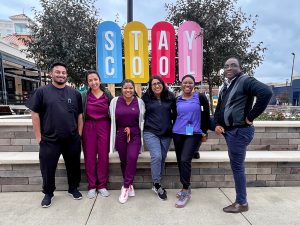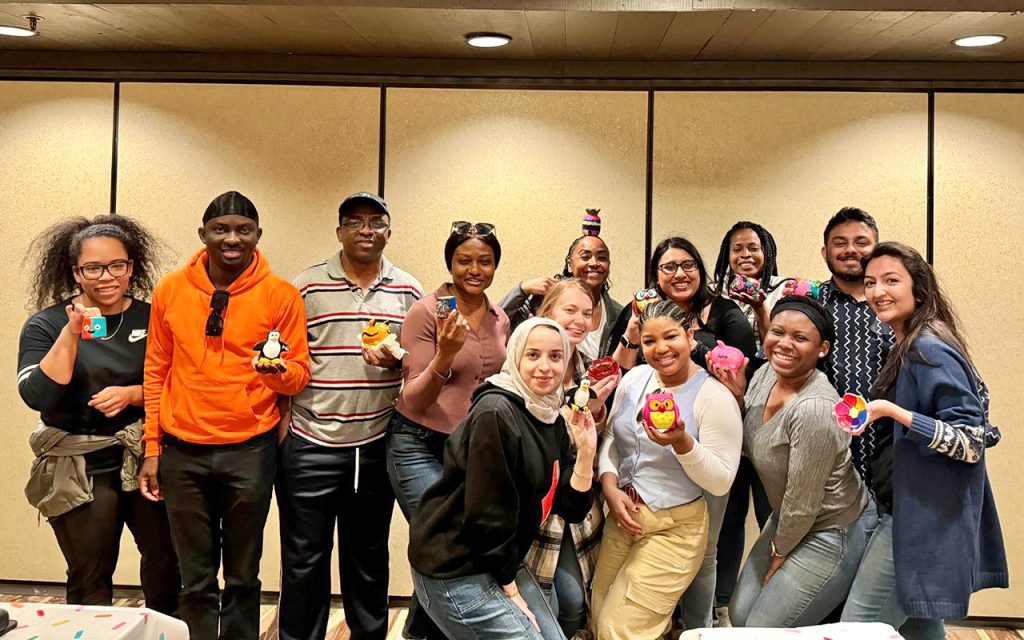 By Dr. Sushania Pryce
By Dr. Sushania Pryce
In U.S. sports, the “rookie” is the newest member of the team. In basketball, the rookie often doesn’t get to begin the game with the “starting five”—the group of skillful players who start the game—but they are always eager to play. When I left my home country to begin my journey as a resident in the United States, my initial thought was that I would be just like the rookie. To some extent the analogy is true, but in the case of being a medical intern, you are both a rookie and part of the starting five: even though you’re new to the team, you have to play every game.

Intern year is known to be the most stressful and intense year across all residency programs. It is a year of immense learning, not just medical knowledge but also navigating health systems and the institutional “way of life.” This is especially true if you didn’t go to medical school in the United States. Your intern year is where you develop the skills you’ll need to become a successful resident and, ultimately, physician in your chosen specialty. So, the question is, how do we overcome being the rookie on the bench while also being in the starting five?
One of the most important skills to develop as an intern is time management. A question I get asked all the time is, “How do you do it all?” While there is no easy answer to this question, there are a few tips and tricks that I have picked up along the way that help me effectively manage my time. The first is understanding how to triage your tasks; knowing how to address important tasks first is crucial to managing your time effectively. Your day will consist not only of seeing patients but also addressing administrative tasks.
Tending to administrative tasks is one of the markers of professionalism in residency. Knowing, for example, when to respond right away to an email versus pinning it to the top of your inbox and getting to it later is crucial to managing your intern year and the rest of your career. I’ve found it helpful to set a time each day to complete administrative tasks. You will probably not be able to get to that email right away when you start your day, and you know that at the end of the day you’ll need to log your hours, so reserve a time slot each day somewhere in between to address these sorts of administrative tasks before they can pile up and become a source of stress.
Even though intern year involves immense learning, you can pretty much forget the idea of traditional studying, as in sitting down for hours reading a book. Instead, find creative ways throughout your day to perform small “learning bursts.” This may be in the form of accessing apps, websites, or other reputable sources on your phone to learn about a patient’s diagnosis or hospital protocol systems. Of course, learning at the bedside is still the gold standard, and you will learn the most from simply seeing patients.

A lot of people talk about wellness, but a lot of us don’t practice or prioritize it. Proper nutrition, exercise, and rest are important for our overall well-being and make for a physician who is better able to take care of their patients. However, even if you stay on top of your health, it’s easy to get consumed by work and postpone enjoyment. My tip for this is to try scheduling your vacations well in advance. I know sometimes it can be hard to plan something that far ahead, but trust me: intern year will feel less stressful when you know you have a vacation coming up. If you can, try to disperse your vacation time throughout your schedule to give yourself multiple breaks to look forward to.
Finally, one of the best things my colleagues and I did during our intern year was form a resident support group. At least once per month, we met to share our experiences. This safe space served as a great reminder that we were not doing this alone and that we had each other to lean on and ask for help when we needed it. It was also a great way to create and maintain a feeling of camaraderie, especially when we were on different rotation blocks.

I know it can feel overwhelming to be the rookie on the team, but remember that, just like in basketball, a single player doesn’t win the championship on their own: it takes a whole organization. So lean on your team for help, work on your game plan, practice your skills, find a good coach if you can, and soon, you won’t be the rookie anymore—you’ll have earned your place in the starting five.
Dr. Sushania Pryce is a returning author to Journeys in Medicine. Read her entry from 2023 here: From FOMO to Family Medicine.


